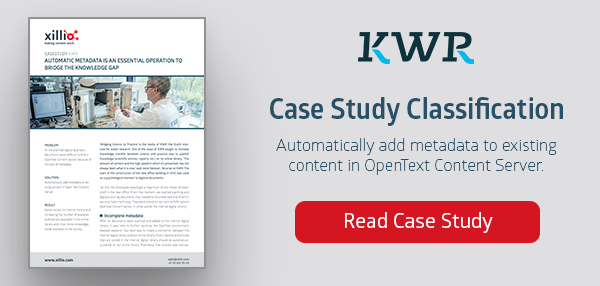People & metadata: a love-hate relationship
by Evan Goris, on Jan 31, 2014 10:10:00 AM
People enjoy the benefits of metadata, but hate assigning it. The labor involved can be designed more smartly, reducing the manual work while ensuring high-quality metadata is assigned, letting people benefit from its power.
The NSA gave metadata a bad name last year, but there are many equally powerful and non-harmful applications of meta information. High-quality metadata added to enterprise content allows for information to be found through internal search engines, content publishing processes to be automated, and people to collaborate more efficiently.
Escaping metadata assignment
The need for metadata is evident. Still, assigning metadata to information is hardly a no-brainer. In fact, people tend to stay away from metadata as much as they can. Not only end-users of information, but also many people with editorial responsibility or intimate knowledge of a content management system try to escape from metadata.

Taking a shortcut
The reason is often understandable and relates to metadata implementations in the systems. If metadata assignment is restricted to a manual job of tagging information, and if the "reward" of attaching correct metadata is unclear, the editor will take a shortcut applying no metadata (if workflow allows it), randomly assigning, or best-guessing them.
Negative effects of missing metadata
Low-quality, or even absent, metadata will have a bad effect on the search results (people are unable to find what they are looking for), inhibits workflow automation (keeping manual involvement at a higher level than necessary), and hinders effective collaboration between people in the organization.
Reducing the burden
How can we ensure editors assign high-quality metadata? By reducing the burden of tagging as much as possible. Manual assignment should be restricted to meta information that cannot be deduced from the context. Intelligent systems for auto classification and data hygiene can do a lot in this respect.
Enabling metadata-driven functionality
Our content classification software, for instance, can propose metadata or automatically assign them when a user saves a document. The meta values are designed together with the organization. They are based on the content itself, business terminology, and contextual analysis. This type of service allows organizations to enable the full potential of metadata-driven ECM functionality without burdening people with the unpopular manual tagging.
---------------------------------------------------------------------





-9.png?width=448&height=81&name=Untitled%20(400%20x%20200%20px)-9.png)